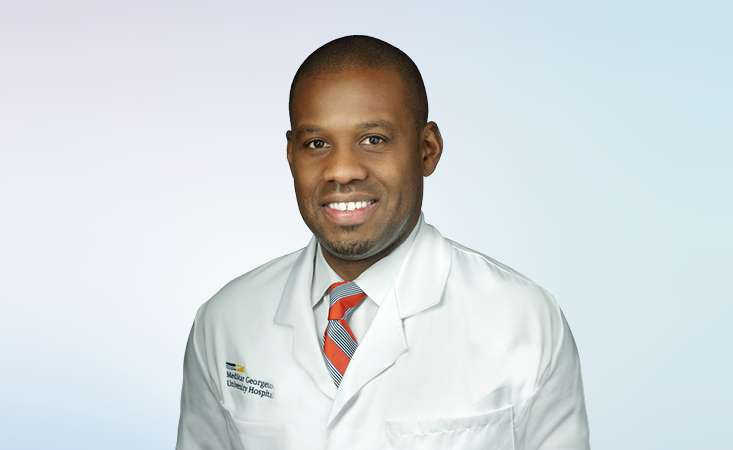
Marcus Noel, MD
Growing up, Marcus Noel, MD, always enjoyed science – especially biology. He also loved sports and dreamt of playing professional basketball someday.
A torn ligament in his knee changed the course of his life in two ways: It took away the possibility of a career in sports, and it introduced him to Dr. Brian Cole, a Black orthopedic surgeon.
Dr. Cole was the first Black physician Dr. Noel had encountered, and he was the one who encouraged young Dr. Noel to continue to do well in school and explore his interest in science.
As a college student, Dr. Noel found himself drawn to medicine, which combined science and his desire to help people. Thinking of following Dr. Cole’s footsteps and wanting to stay involved in sports by helping athletes, Dr. Noel thought about going into orthopedic surgery.
But during his medical school rotations, Dr. Noel found himself drawn to a different type of medicine – oncology.
Again, it was a personal interaction that cemented his path. This time, it was a patient. During his third year of medical school, Dr. Noel visited a man with advanced rectal cancer in the hospital every day at 5 a.m. “Despite his suffering, he took a great deal of interest in me. He asked me lots of questions, and our conversations focused more on me and my future than on him and his disease.”
This was the type of patient – selfless, kind – Dr. Noel wanted to interact with and to help.
Today, Dr. Noel is an associate professor of medicine and medical director of the Clinical Research Management Office at Georgetown Lombardi Comprehensive Cancer Center and a member of PanCAN’s Scientific and Medical Advisory Board. He focuses on gastrointestinal cancer, with a special interest in pancreatic cancer. And he finds inspiration from his patients and their strength in coping with their illness every day.
“I’m humbled by my patients,” Dr. Noel said. “They give me such positive feedback and, despite all that’s on their plates, they take time to chat with me and show their gratitude.”
Although there are more treatment options for pancreatic cancer patients now than during Dr. Noel’s training, he is still frustrated by the disease’s low survival rates. So Dr. Noel conducts clinical research to advance new treatment options. His focus is on drug development and early clinical trials, testing new drugs and treatment combinations, such as a clinical trial that will evaluate experimental drugs in combination with chemotherapy in patients whose tumor may be surgically removable.
“It used to be more common to recommend patients to undergo surgery first and then chemotherapy after,” he explained. “But more evidence is suggesting that giving the patient treatment before – and often also after – surgery can lead to better outcomes.”
Dr. Noel is also passionate about ensuring that all patients – regardless of their race, ethnicity, gender identity or other factors – receive excellent care. But inequities and disparities remain. And for Black Americans, those disparities result in the highest pancreatic cancer incidence and death rates of any racial or ethnic group.
“Unfortunately, systemic racism and inequalities continue to exist,” he said. “It’s important for all of us to rally together and come up with solutions.”
Dr. Noel now brings his expertise to PanCAN’s Health Equity Committee, a diverse group PanCAN has brought together with a goal to eliminate health disparities and advance health equity for those impacted by pancreatic cancer.
His message to the Black community is to be aware of risk factors for pancreatic cancer – especially conditions like diabetes and obesity that are prevalent within that community. And, he encourages everyone to reach out to their healthcare teams when something feels wrong.
“Someone who’s losing weight, not feeling well, should really speak up to their physician,” he said.
“Don’t be afraid to advocate for yourself.”
















